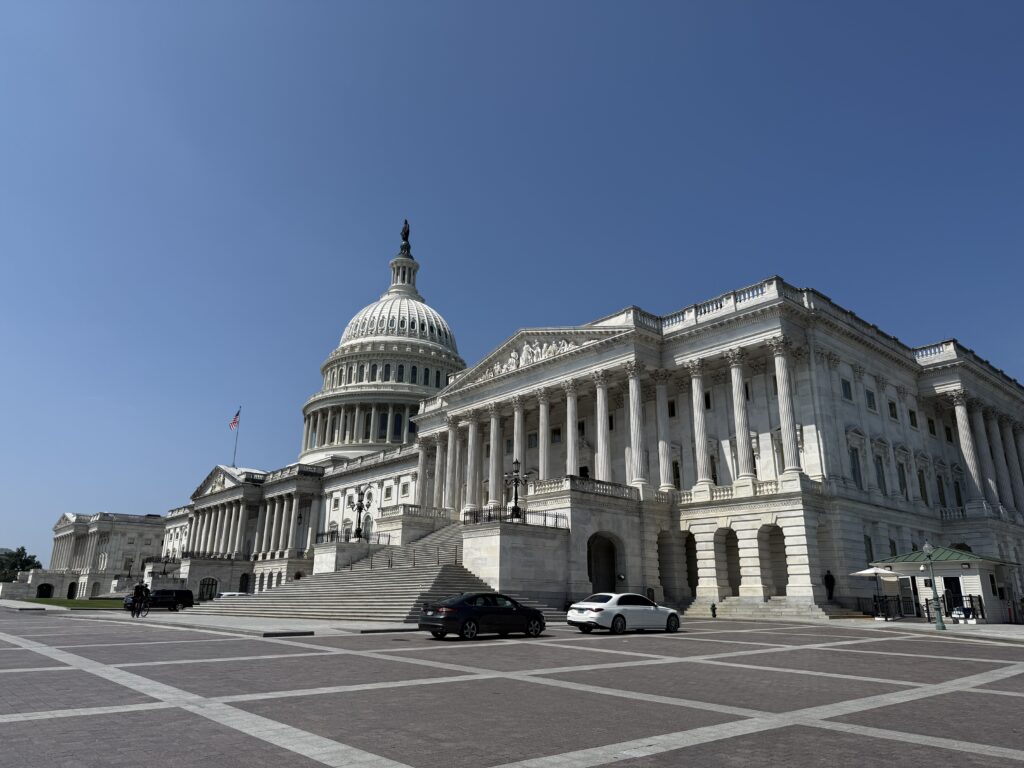The U.S. Capitol building in Washington, D.C., is pictured on Sunday, June 29, 2025. (Photo by Jennifer Shutt/States Newsroom)
WASHINGTON — The nonpartisan Congressional Budget Office announced Thursday that if lawmakers permanently extend the enhanced tax credits for certain people who buy their health insurance through the Affordable Care Act Marketplace, it would cost the government $350 billion over 10 years and increase the number of those with health insurance by 3.8 million.
The 14-page letter from CBO Director Phillip L. Swagel to congressional leaders projected that extending the enhanced tax credits would reduce the average cost of gross premiums for benchmark plans by 7.6%.
“The estimated decline in benchmark premiums is the result of the expectation that people enrolling in the marketplaces would be healthier on average if the expanded premium tax credit were extended,” Swagel wrote.
The nonpartisan health research organization KFF writes on its website the “premium tax credit limits an individual’s contribution toward the premium of the ‘benchmark’ plan, the second-lowest cost silver plan in their Marketplace.”
Congress taking action to extend the enhanced tax credits before the end of September, Swagel wrote, would lead 2026 premiums to decrease by 2.4% compared to previous projections.
The enhanced premium tax credits, established by Democrats in 2021 as part of a massive COVID-19 relief package, were extended in 2022 through the Inflation Reduction Act. They are set to expire at the end of 2025.
Extension late in the year
Lawmakers taking action to extend the tax credits later in the year impacts CBO’s projections in two ways.
“First, in CBO’s estimates, the likelihood that gross premiums for 2026 would be adjusted downward would fall to zero after the start of open enrollment,” Swagel wrote, adding that begins Nov. 1 in most marketplaces.
“Second, the estimates would reflect a smaller likelihood that enrollees will see net premiums that incorporate the expanded credit structure at the time they select their marketplace plan (the net premium is the amount of the premium after accounting for the tax credit),” Swagel wrote. “CBO estimates that an enactment date later than September 30 would result in lower costs to the federal government and smaller increases in 2026 enrollment than those presented here.”
This is relevant because the tax credits have become intertwined in debates on Capitol Hill over how to fund the government for a couple months as lawmakers try to complete their work on the full-year spending bills.
While conversations about health policy and a stopgap spending bill would traditionally take place separately, concerns about prices spiking during the open enrollment period have merged the issues ahead of the Oct. 1 government shutdown deadline.
Timing is crucial, Democrats say, since the open enrollment period begins on Nov. 1, well before the credits expire.
Speaker Mike Johnson, R-La., said earlier this week he views negotiations over the enhanced tax credits as “a December policy issue, not a September funding issue,” regardless of the timeline for open enrollment.
Republicans, Democrats at odds
Senate Budget Committee ranking member Jeff Merkley, D-Ore., wrote in a statement the CBO letter shows “Republicans in Congress are driving costs up for working families.
“That includes a huge increase in health care costs as they slash the tax credits that so many families rely on. It’s disgraceful, and only makes it harder for families to make ends meet. This is just more of their families lose, and billionaires win agenda.”
Vermont independent Sen. Bernie Sanders, ranking member on the Committee on Health, Education, Labor and Pensions, wrote that “Americans already pay, by far, the highest prices in the world for health care. And it is going to get much worse.
“Thanks to the massive cuts to health care in Trump’s ‘big beautiful bill,’ health insurance premiums will rise, on average, by 75% for 20 million Americans — all so Republicans could give massive tax breaks to billionaires and huge corporations. Working class Americans cannot afford that. These cuts must be rescinded.”
House Budget Committee Chairman Jodey Arrington, R-Texas, urged his party not to extend the enhanced tax credits in an op-ed published in the Washington Examiner on Thursday morning before the CBO letter was publicly released.
“Despite Democrats designing these temporary COVID-19 credits to expire this year, they now not only want to extend them—they want to make them permanent,” Arrington wrote. “The truth is, even after the Biden COVID-19 credits expire, low- and middle-income families will continue to have access to affordable coverage. Obamacare’s traditional tax credits will operate as designed.”


